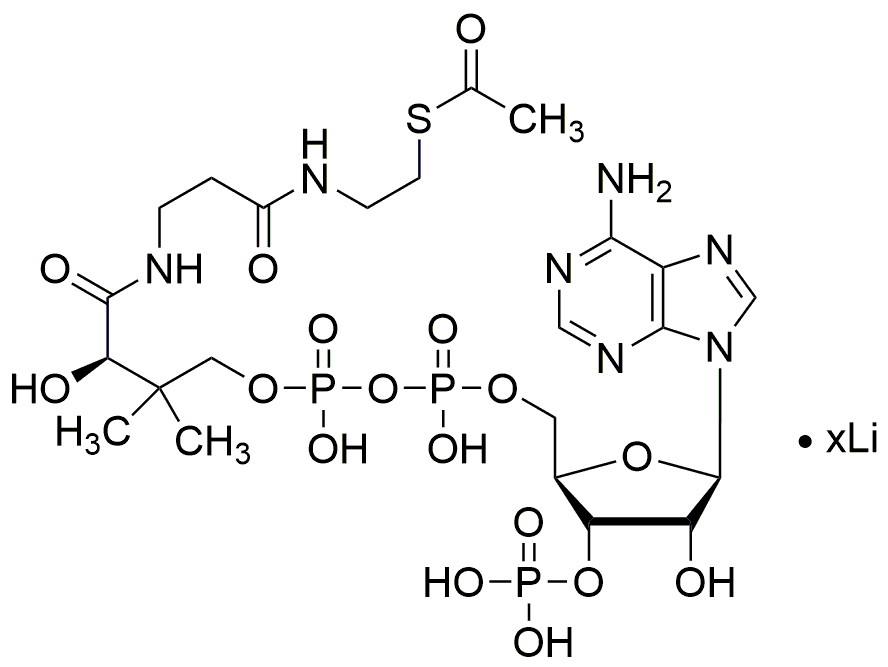Acetyl coenzyme A lithium salt is widely utilized in research focused on:
- Biochemical Research: This compound plays a crucial role in metabolic studies, particularly in understanding fatty acid metabolism and energy production in cells.
- Pharmaceutical Development: It serves as a key intermediate in the synthesis of various pharmaceuticals, aiding in the development of drugs that target metabolic disorders.
- Enzyme Activity Studies: Researchers use it to investigate enzyme kinetics and mechanisms, especially in studies related to acetylation processes.
- Cell Culture Applications: It is employed in cell culture media to enhance cell growth and productivity, particularly in the production of biopharmaceuticals.
- Metabolomics: This compound is essential in metabolomics studies, helping scientists analyze metabolic profiles and understand disease mechanisms.
Informations générales
Propriétés
Sécurité et réglementation
Applications
Acetyl coenzyme A lithium salt is widely utilized in research focused on:
- Biochemical Research: This compound plays a crucial role in metabolic studies, particularly in understanding fatty acid metabolism and energy production in cells.
- Pharmaceutical Development: It serves as a key intermediate in the synthesis of various pharmaceuticals, aiding in the development of drugs that target metabolic disorders.
- Enzyme Activity Studies: Researchers use it to investigate enzyme kinetics and mechanisms, especially in studies related to acetylation processes.
- Cell Culture Applications: It is employed in cell culture media to enhance cell growth and productivity, particularly in the production of biopharmaceuticals.
- Metabolomics: This compound is essential in metabolomics studies, helping scientists analyze metabolic profiles and understand disease mechanisms.
Documents
Fiches de données de sécurité (FDS)
La FDS fournit des informations de sécurité complètes sur la manipulation, le stockage et l’élimination du produit.
Spécifications du produit (PS)
Le PS fournit une description complète des propriétés du produit, notamment sa composition chimique, son état physique, sa pureté et les exigences de stockage. Il détaille également les plages de qualité acceptables et les applications prévues du produit.
Certificats d'analyse (COA)
Recherchez des certificats d'analyse (COA) en saisissant le numéro de lot du produit. Les numéros de lot et de lot se trouvent sur l'étiquette d'un produit, après les mots « Lot » ou « Lot de fabrication ».
Numéro de catalogue
Numéro de lot/série
Certificats d'origine (COO)
Ce certificat d'exploitation confirme le pays dans lequel le produit a été fabriqué, et détaille également les matériaux et composants utilisés et s'il est issu de sources naturelles, synthétiques ou autres sources spécifiques. Ce certificat peut être requis pour les douanes, le commerce et la conformité réglementaire.
Numéro de catalogue
Numéro de lot/série
Fiches de données de sécurité (FDS)
La FDS fournit des informations de sécurité complètes sur la manipulation, le stockage et l’élimination du produit.
DownloadSpécifications du produit (PS)
Le PS fournit une description complète des propriétés du produit, notamment sa composition chimique, son état physique, sa pureté et les exigences de stockage. Il détaille également les plages de qualité acceptables et les applications prévues du produit.
DownloadCertificats d'analyse (COA)
Recherchez des certificats d'analyse (COA) en saisissant le numéro de lot du produit. Les numéros de lot et de lot se trouvent sur l'étiquette d'un produit, après les mots « Lot » ou « Lot de fabrication ».
Numéro de catalogue
Numéro de lot/série
Certificats d'origine (COO)
Ce certificat d'exploitation confirme le pays dans lequel le produit a été fabriqué, et détaille également les matériaux et composants utilisés et s'il est issu de sources naturelles, synthétiques ou autres sources spécifiques. Ce certificat peut être requis pour les douanes, le commerce et la conformité réglementaire.


